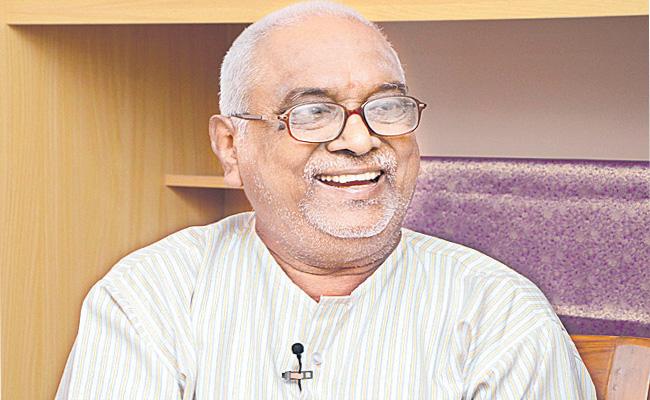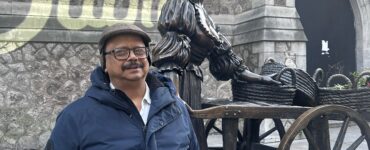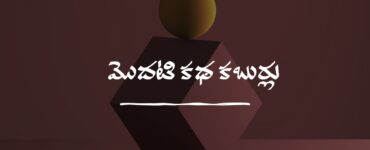Telugu original: Afsar
English translation: K. Venkat Reddy @ EFL University, Hyderabad
If one were to chronicle the Bezwada’s literary saga, undoubtedly, a chapter would be reserved for Indraganti Srikantha Sharma (ISS). Keep aside the dates and the years when ISS came to Bezwada, his joining the Andhra Jyothi is not something private or personal. It is inseparably, a part and parcel of the saga of Telugu literature.
“ the times I spent in Vijayawada are literature celebrated. Spending times with three generations of authors is ever unforgettable”.
The last time I had a conversation with ISS was on the 20 of January. For about four hours I had been in his presence laughing and being in mirth – although compared to my earlier occasions with him this time he did not sound too healthy. But that glow of meeting an old friend did not diminish in him. “ this joyous energy in him is having seen you and remembering Bezwada”, said Janaki Bala and other family members.
A peek into the past – I joined Andhra Jyothi 8 years after ISS had done stepped in. Though subsequently he moved to All India Radio, I never missed hearing his name; would come up almost regularly. Puranam, Srikantha Sharma and Sri Ramana were Jyothithrayam of that era. At that time Nanduri was the editor; never had a day passed without hearing these three names coming from his mouth. Though we belonged to the Andhra Jyothi, we never heard about political issues coming from the mouth of Nanduri. His passions were soaked in either literature, or new wave films or music. Srikantha Sharma had similar tastes.
The first write-up of mine published in AJ was ‘Pessimistic Stalwart Antony Chekhov’. Nanduri used to have numerous problems on this write-up. He strongly believed Chekhov was not a pessimist. At the same time I vehemently argued that Chekhov was a pessimist (Frankly even now I haven’t understood the distinction between the two!). What this write-up did to me was something amazing; it conferred a visa on me to be in the opulent company of the literary giants of Bezwada of that era. Especially with Srikantha Sharma who had been an ardent fan of Chekhov.
That same evening I met SS for the first time. I was 19 and it has been 35 years since our affectionate association took roots! Before that what SS meant to me was merely his works: Great Resolve and Felt Lyrics. The Great Resolve has always been a companion attached. After I had met him on Radio, these two works receded from being subject of our debates. From then on whoever visited Bezwada, SS used to send me a word and, I would be there without fail. It became a routine. SS and the other numerous guests never felt uncomfortable with my shyness and my reticence. They bore with great patience my atypical silence and the sporadic contribution here and there. Ushasri was an exception to this behaviour of mine. He could not take kindly my silence. Bequeathing me to SS he ordered,
“ Rei Sharma, teach him some words”.
Though he did not succeed as much in making me vocal, our friendship blossomed and fared forward.
There is a noticeable age gap between me and SS. But his love for me has never been conditioned by these parameters. He is not one of those people who change words according the age and the visage! He is perhaps one of the fewer great souls who have such large hearts. That same quality, I trust, may have driven our camaraderie this far.
SS was a resident of several worlds. He had been a songster, poet, radio programmer, journalist, editor and so on. If we shove him into any one only of those categories, he would simply remain a stranger. He stepped into the non-metered free verse very late. His priority had been his lyrics. The Felt Lyrics have made his foot safe on the non-metered genre of poetry. That’s a stopover for SS 15 years after he started his sojourn in poetry. Till then that lyric slant of his was discernible even in his vachana kavithwam. His Felt Lyrics testifies the struggle he went through to overcome this lyric-slant in order to reach the requirements of vachanam. Freezing the image in poetry, he traversed from its description into the world of signification. That’s why his imaginary or unveiled poetic images appear robust. This image may be of nature or of human nature. He may not be visible in these two examples, but we’ll get to grasp how he thinks in images:
the life spring of the sunrays
touching the heart of the river sleepy
will jolt the boats up..
like the waters slipping away in streams
from the hilltop boulders
Years passed by how many!
Being inundated in the pursuit of trying to appreciate him in his numerous literary forms, I asked him, ‘how do you want to be seen’? ‘Just like a friend’, he said laughing it off loudly. I persisted. He had to say something as to how he wants to be understood in his numerous roles.
“life decides some roles and ordains some others. I have merely followed them. I haven’t been able to be imprisoned in one particular trait. Perhaps this is due to the lifelong learning that I nurtured by being free in life”.
Although it is known to all that ISS has a strong slant for poetry, from the start I have a belief that it is only in his vachanam we can get to see his life size potential as an author. Starting from his early stories -1962- to the recent Surname Indraganti, Srikatha Sharma’s free verse is equally towering as his metric poetry. When Ismail’s writeup, published in the 80s in the Andhra Jyothi, became a huge controversy, SS and a few others were pushed to take shelter in the shadows of the Felt Poetry. I strongly believed then and believe now that SS could not dissolve himself completely into that genre, as a result he got into all the available forms of free verse or prose poetry. Of all those prose forms his journey in felt poetry has a dissimilar tapestry. In fact during the 30 odd years of our conversations there had been little talk on metric poetry. Be it western literature or Indian literature, his preoccupation had always been on the vachana writers. Hardly was there an instance during our conversations when he did not think about the names of Chalam and Sripada, the doyens of Telugu vachana poetry.
“ in the absence of these two names it’s hard for me to imagine Modern Telugu Vachanam. If literature has to have a model, style or syllabus, I’ll begin with these two writers”, his opinion in one of the occasions.
Poetry appeared like an interlude for him among his numerous literary pursuits. A cursory glance at his works, a mammoth two volumes, published by his family members, and Analpa and Blaram shall loudly testify my stand. In them he himself says, “Chalam, Devulapalli Krishna Sastry, Sripada, Sri Sri, Buchi Babu, Devrakonda Bala GangadharaTilak, Rachakonda Vishwanatha Sastry, Ajantha – were the writers who pleasantly choked him me with their artistic charm. We kept discussing the literary merits of these writers almost on all occasions. The bonus point of these discussions is that in every discussion he would reveal an incident from their personal life that had never been known to the outside world. It was hard for me to restrain tears from raining down when he had shown me the small pieces of paper which Krishna Sastry used as conduit for conversations. A few of those slips were under the safe keep of Nanduri and SS. That pretty calligraphy written on those slips appear to me still just like a rainbow in front of my eyes. SS meeting Chalam for the first time – his guidance in his love life and later about his marriage – Tilak’s playing cards – Rachakonda talking after his 3 peg – the nocturnal strolls through the streets of Bezwada with Ajantha – .
The other turn in my association with SS was the Sakshi Club congregations on the terrace of Puranam’s residence located on the Masjid street in Bezwada. ‘A month a guest’ model of conversations; they used to happen in two parts. First part was open to all and the send half was strictly private. The second part was open to a restricted a few; celebrated with all the due athithdhi devo bhava (guests are gods) type traditions, befitting hospitality. Although I did not have arangetram (initiation) into some of the consumptions on the menu, I had the entry pass purely because of my literary activism. It’s this second part which I fathom was the truly revealing session. The guests who otherwise known to the outer world as the most refined and polite used to break open their true selves unabashedly in this particularsession. SS used to be an exception to this conduct; he was consistent in both the worlds.
SS philosophy of life is ‘experience the nectar of friendship when it’s available’. He had that inimitable knack to foresee phases when friendships turn sour. Moreover, It were the times when erudite comradery of Bezwada literary landscape was turning sour and hostile. That were also the times when Puranam had a faceoff with the Virasam. A few members stayed away from the Sakshi Club’s meets. But ISS had no problem with the caustic situation that had just then opened up. KV Ramana Reddy when visiting Bezwada used to visit and meet up with Srikantha Sarma without fail. Though SS sometimes booed and criticized K. V. Ramana Reddy, it’s their friendship which won over the ideological difference.
Our lives changed forever after moved to Hyderabad; but not in our friendship. When he was at the helm of affairs of the Andhra Prabha weekly, as its editor, we never stopped meeting. At least once a week we used to meet at some or the other place. That was hard times- moneywise for us both – Kalpana and me. He made us write, translate – which eventually helped earn some bucks to make the ends meet and stand. SS and his wife Janakibala were some of the few important people who visited us at the hospital when Anindoo was born. Firstly, the kiddo was named Anindya. Saying , ‘it doesn’t sound modern’, SS and Mohana Prasad changed it to Anindu.
“Anindu means the Sun; who is not Indu, the Moon. Right?” he queried.
Indraganti Srikantha Sharma has a successful life journey. There are very few who led such contented life.
Note: Teluguisms are purposely rendered as they are i.e. Telgish. As a result there are deviations from the accepted norm.









Athadu edadalu jayinchaadu!
[…] Surname of Affection […]